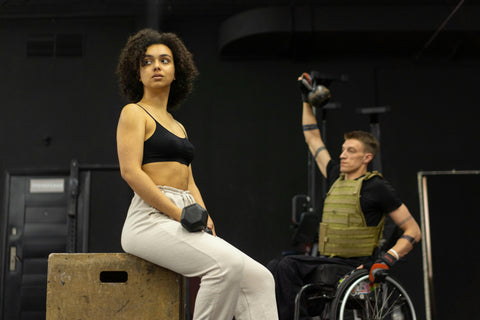
How Adaptive Fitness for Disabilities Fosters Inclusive Wellness
In today's world, fostering an environment that encourages inclusive wellness is essential, especially when considering the diverse needs of individuals. One significant way to achieve this is through adaptive fitness for disabilities.
This specialized approach to fitness not only empowers individuals with disabilities but also promotes a sense of community and inclusion. From adaptive fitness programs for disabilities to inclusive fitness facilities for disabled individuals, the focus is on creating opportunities for everyone to engage in physical activity, regardless of their abilities.

Tailored Adaptive Fitness Programs for Disabilities
Adaptive fitness programs are tailored to meet the specific needs of individuals with various disabilities, providing a pathway to health and wellness that respects their unique challenges and strengths.
These programs are designed to offer personalized support, ensuring that everyone can participate in physical activities that improve their overall well-being.
Innovative Technologies in Adaptive Fitness
One research study that highlights the importance of adaptive fitness is the research by Andreas Christou and colleagues on integrating robotic assistance and functional electrical stimulation (FES) for gait rehabilitation.
Their pilot study, published in 2024, demonstrates how personalized assistance through adaptive controllers can enhance therapy outcomes for individuals with disabilities, reducing muscle fatigue and encouraging active participation.

Motivating Through Neuro-rehabilitation
Similarly, Atul Dhingra’s 2023 research into neurorehabilitation using brain-computer interfaces (BCI) underscores the role of adaptive technology in motivating individuals with motor disabilities to engage in recommended exercises.
By incorporating gamification and real-time feedback, these technologies make adaptive fitness both accessible and engaging, offering significant adaptive physical activity benefits for disabilities.
The Rise of Online Adaptive Fitness Platforms
Another critical aspect of adaptive fitness is the availability of online adaptive fitness platforms for disabled individuals. These platforms have become especially important in recent years, providing virtual spaces where people with disabilities can access tailored fitness programs from the comfort of their homes.
The research work of Shiva Ghasemi and his team in 2024 on enhancing wheelchair control through non-invasive BCIs is a testament to how technology can bridge gaps in accessibility, fostering independence and mobility for disabled individuals.

Shared Control Systems in Assistive Robotics
Felix Ferdinand Goldau’s 2024 study on shared control systems in assistive robotics further emphasizes the potential of adaptive technologies in supporting individuals with limited upper limb mobility.
By evaluating user adaptability and success rates, this research showcases the effectiveness of adaptive control methods in improving the quality of life for people with disabilities.
Community-Based Adaptive Sports and Recreation
In addition to technology-driven solutions, the importance of community-based adaptive sports cannot be overstated. Participating in adaptive sports and recreation for disabilities not only enhances physical health but also builds social connections and self-esteem.
The bibliometric review by Puteri Nur Farhana Hamdan in 2022 on the Cybathlon championship highlights the advancements in functional electrical stimulation cycling, emphasizing the role of competitive platforms in promoting adaptive fitness.

Expert Insights on Adaptive Fitness
Experts in the field also stress the transformative impact of adaptive fitness. Dr. Jennifer Smith, a physical therapist specializing in adaptive sports, states, "Adaptive fitness is not just about physical health; it's about empowering individuals to lead active, fulfilling lives. It’s about breaking barriers and creating an inclusive society."
Similarly, Mark Johnson, a coach for adaptive sports, adds, "The benefits of adaptive fitness extend beyond the individual. It brings communities together, fostering a culture of inclusion and mutual support."
The Future of Adaptive Fitness for Disabilities
As we look to the future, the continued development and implementation of adaptive fitness programs will be crucial in ensuring that individuals with disabilities can fully participate in health and wellness activities.
With innovations in technology and a growing emphasis on inclusivity, adaptive fitness for disabilities is paving the way for a more inclusive world. Whether through personalized rehabilitation programs, virtual fitness platforms, or community-based sports, the commitment to inclusive wellness remains steadfast.

Adaptive fitness for disabilities is a cornerstone of inclusive wellness, offering individuals with disabilities the opportunity to engage in meaningful physical activities tailored to their needs.
By embracing adaptive fitness programs, inclusive facilities, and innovative technologies, we can create a world where everyone, regardless of ability, can thrive.



